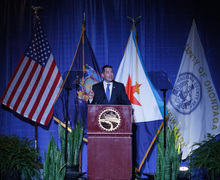Goldberg: Opening Cuban embargo marks Obama’s biggest accomplishment
With less than two years left on the clock, President Barack Obama’s remaining time in office has turned into a push to create his legacy. As his term ticks away, it’s becoming clear that it won’t be health care, immigration reform or an Iran nuclear deal that will define his presidency. Instead, the reopening of relations with Cuba is poised to be the greatest achievement of Obama’s eight years in office.
It’s been said that time heals all wounds. Finally, with a president who wasn’t yet born when Fidel Castro took control in 1959, it seems that the time has come to repair relations between the US and Cuba. Obama began that process with a phone call in January, and accelerated it with two handshakes and a meeting with Raul Castro at last weekend’s Summit of the Americas.
The time has never been better for a change in policy. With American troops all but completely pulled out from Afghanistan and Iraq, Obama has been able to shift the focus of U.S. foreign policy back to our own hemisphere for the first time since 9/11. Cuba, where the policy of embargo and isolation hasn’t seemed to do much good in its 50-year lifespan, is the perfect place to start.
Back in January, Obama revealed the beginning of a plan to normalize relations with our island neighbor. And since then, specific populations of Americans have been able to travel to and conduct business more easily in Cuba. The meeting between these two leaders in Panama last week should further inspire hope for exponential progress in the weeks, months and years to come.
The next step is clear on both sides: the removal of Cuba from the list of nations the U.S. considers sponsors of terrorism. The US has not accused Cuba of any such dealings in many years, and the two presidents’ ultimate goal of establishing embassies in Washington, D.C and Havana rests on this precursor step, which Obama finally took as he submitted his recommendation to Congress on Tuesday to remove Cuba from this list.
There is of course major concern from the usual suspects. Sen. Ted Cruz (R-Texas) and Sen. Marco Rubio (R-Fla.), both 2016 Presidential candidates and both Cuban-Americans, warn of the resilience and power of the Castro regime. While their concerns, and those of the Cuban-American community, should be taken seriously, they should also be taken with a grain of salt. America’s current strategy of economic and diplomatic sanctions hasn’t induced any change and it’s a different world than it was when Cuba became America’s public enemy No. 1 in the Western Hemisphere.
While Obama doesn’t harbor the same fears as his critics, he is by no means taking these negotiations lightly. He’s not jumping in headfirst. Though he and Castro last week agreed to disagree on a number of topics, Obama is earnestly prepared to negotiate. He knows how much the U.S. has to gain, but clearly understands that each step and decision must be carefully weighed and considered. He demonstrated this commitment to careful, deliberate decision making in his approach to Cuba’s de-classification this week.
With these significant steps forward in the reopening of relations with Cuba, Obama has signaled his commitment to changing the status quo. It takes confidence and guts to tackle a policy as entrenched in the American psyche as our relationship with Cuba, but in doing so Obama has shown how well he understands the true nature of today’s America.
President Obama’s actions with Cuba this week have made it clear that the outlook of our future relations with Cuba are bright, and are sure to define his legacy once he has left office.
Zach Goldberg is a senior economics, policy studies and energy and its impacts major. His column appears weekly. He can be reached at zrgoldbe@syr.edu and followed on Twitter @zgolds.
Published on April 15, 2015 at 11:18 pm





